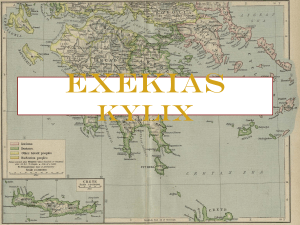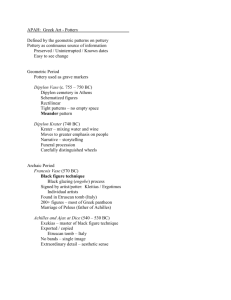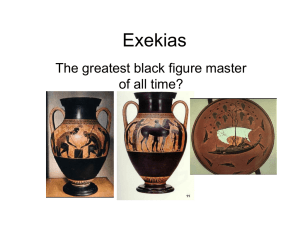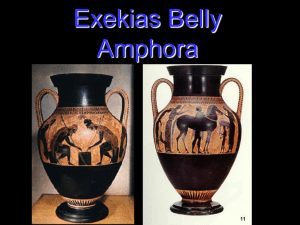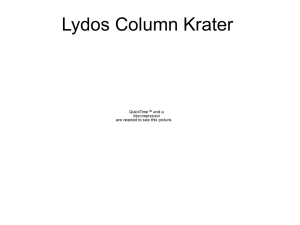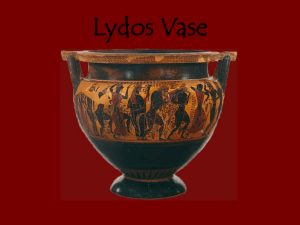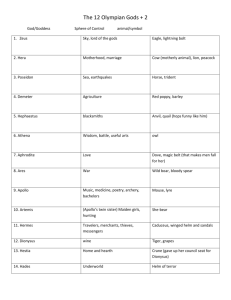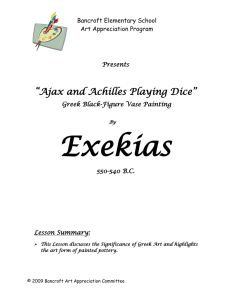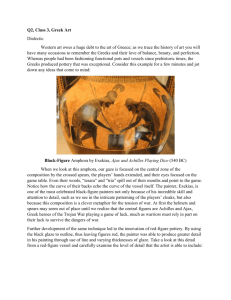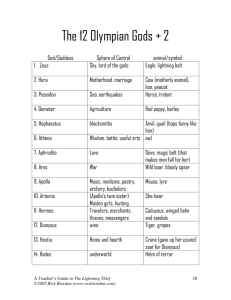Exekias Kylix (2010).
advertisement
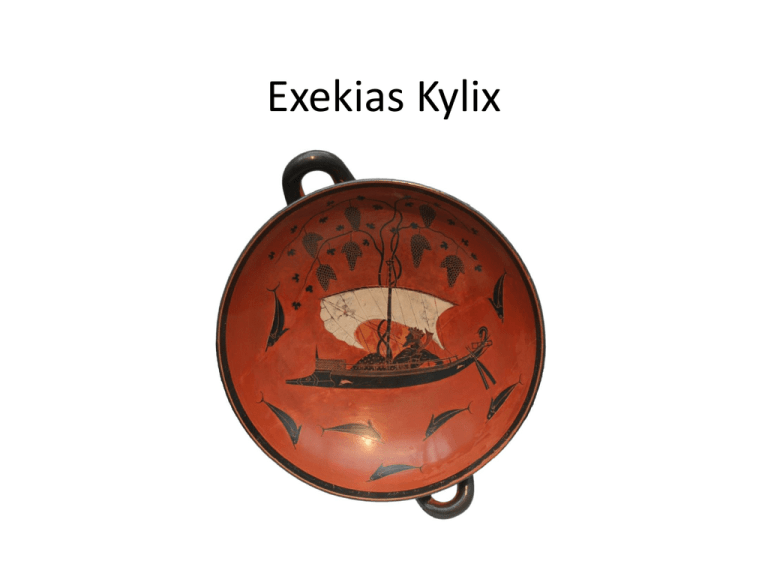
Exekias Kylix Name – Exekias Kylix Made – 535 BC Size – 30.5 cm Potter – Exekias Painter – Exekias Exekias signed the front face of the foot “Exekias epoiēsen” – “Exekias made (me)” Exekias tended to paint the pots he potted, this is why there is usually only one name on an ‘Exekias’ vase. Shape Vase shape - Exekias introduced new shape and so it was called ‘A type’. It has a shallow bowl with plain lip and a splaying foot offset from the bowl Use – It was a cup for drinking wine, most probably at the Symposium Exekias invented this shape This Kylix was a new type of cup in Exekias’ time, it is distinguished by the absence of an offset rim The central interior, which is decorated is called a tondo Lip of the cup Handle The foot Front face of the foot Scene You can tell the figure in the centre of the scene is Dionysus in two ways i) The wine horn in his hand ii) The twin vines, heavy with clusters of grapes Dionysus is the god of ecstasy, festivals, celebration, grape harvest, wine making and wine as well as inspiring joyful worship. This relates to the vase as it was specifically used for drinking wine As you drank from the vase it would give you the illusion that the boat was floating The background is a coral red slip and it is meant to resemble wine and the wine dark sea of the Mediterranean Mood – Dionysus has reclined in his boat. The scene looks serene, almost as if he is on a peaceful journey and joined by his maenads and satyrs The character is very typical of Exekias – he prefers to choose quiet moments in an otherwise lively narrative The myth Some Tyrrhenian pirates were sailing by when they spotted Dionysus on the shore. They grabbed him and attempted to imprison him, Dionysus with them peacefully and sat on the ship, watching the pirates. Suddenly, he showed his divine power. Wine flowed over the boat and a vine sprung up over the mast. The god became a lion and roared at them. The pirates fled with fear and all jumped into the sea, where Dionysus transformed them into dolphins Based on Homer’s story “Hymn to Dionysos” Alternative ending? Only key words such as “sailors” instead of pirates (really can’t find one) Painting Technique Exekias was the greatest and most advanced of the black-figure master painters from his time Exekias created a new slip called a red coral slip, it was created by mixing yellow ochre and a black slip (revolutionary) Unfortunately the coral red did not adhere well with the surface of the clay so the technique was later abandoned Dionysus – Silhouette: The figure is flat and shows no volume. Although Dionysus is reclining he still seems stiff and uncomfortable. Back ache, dislocated shoulders Incised detail: Dionysus’ robe is decorated with small incised crosses Added colour: White is added to the sail and purple (even though you can’t see it) is added to the grapes Nb. Black slip was added thicker than usual which gives added depth and texture Continued.. Exekias added purple to accentuate the grapes and the overall colour of the interior The grapes have been carefully incised to display individual grapes Exterior Silhouette: The three figures have been lined up besides each other in order to try and create depth, they are all in unison and again seem “stiff” with their postures Incised detail: The warriors wear the Corinthian style helmets, incised with details showing horse hair crests (as well as having incised corselets and greaves) Added colour: Exekias has added purple to accentuate the armours of the warriors. However he hasn’t coloured the man in between in order to possibly vary the warriors and add depth with colour These are typical figures of Exekias as all his characters are decorated with fine incised detail, showing almost every hair. He also uses added colour Exterior The myth The dead warrior is Patroclus, Achilles’ best friend who died fighting the Trojans. He has put on Achilles’ armour and gone to fight but was then killed by Hector. A battle ensued over his body. Eventually his armour was stolen by Hector before the body was recovered by the Greeks Armour was the prize of the victors There is slight variations between the two sides. On each side under the root of the handles are two groups of three armed warriors fighting over a corpse - On one side the corpse has been stripped and is in the process of being dragged away - On the other side the dead warrior still lies fully armed, filling the vacant space underneath the handles. Exterior There are 2 pairs of apotropaic eyes painted in black and purple to exaggerated tear ducts and there is a stylized nose. This is why it has a common nickname The Exekias Kylix has two large eyes on each side of the exterior of the cup, and is often referred to as the “eye cup” - These ‘eyes’ were supposed to be magical. When you drink your eyes are hidden and a pair of ‘apotropaic’ eyes look out for you. They were to ward off evil - They also could have formed a humorous theatrical mask when the drinker raised the cup to his face Composition - Exterior Exekias has created an intricate series of patterns to accentuate the shape of the bowl The dead warrior fills the empty space beneath each handle, Patroclus’ body curves outwards to the same shape of the cup The three warriors on each side show a balance of symmetry Upper half of the warriors fills the space between the eyes and the handles The bottom of their bodies fills the space under the handles and under the eyes The curving eyes with their circular pupils' compliment the shape of the vase Composition - Interior Composition - Interior Normally painters only painted the centre of the cup The scene occupies the whole tondo in a free field. It is bounded by the rim of the cup The curve of the bottom of the boat complements the circular shape of the vase The boat is the centre of the tondo and is the focal point Both the vines in the 1/3 space of the vase and the dolphins in the 2/3 of the outside of the circle complement the shape and curve of the vase
